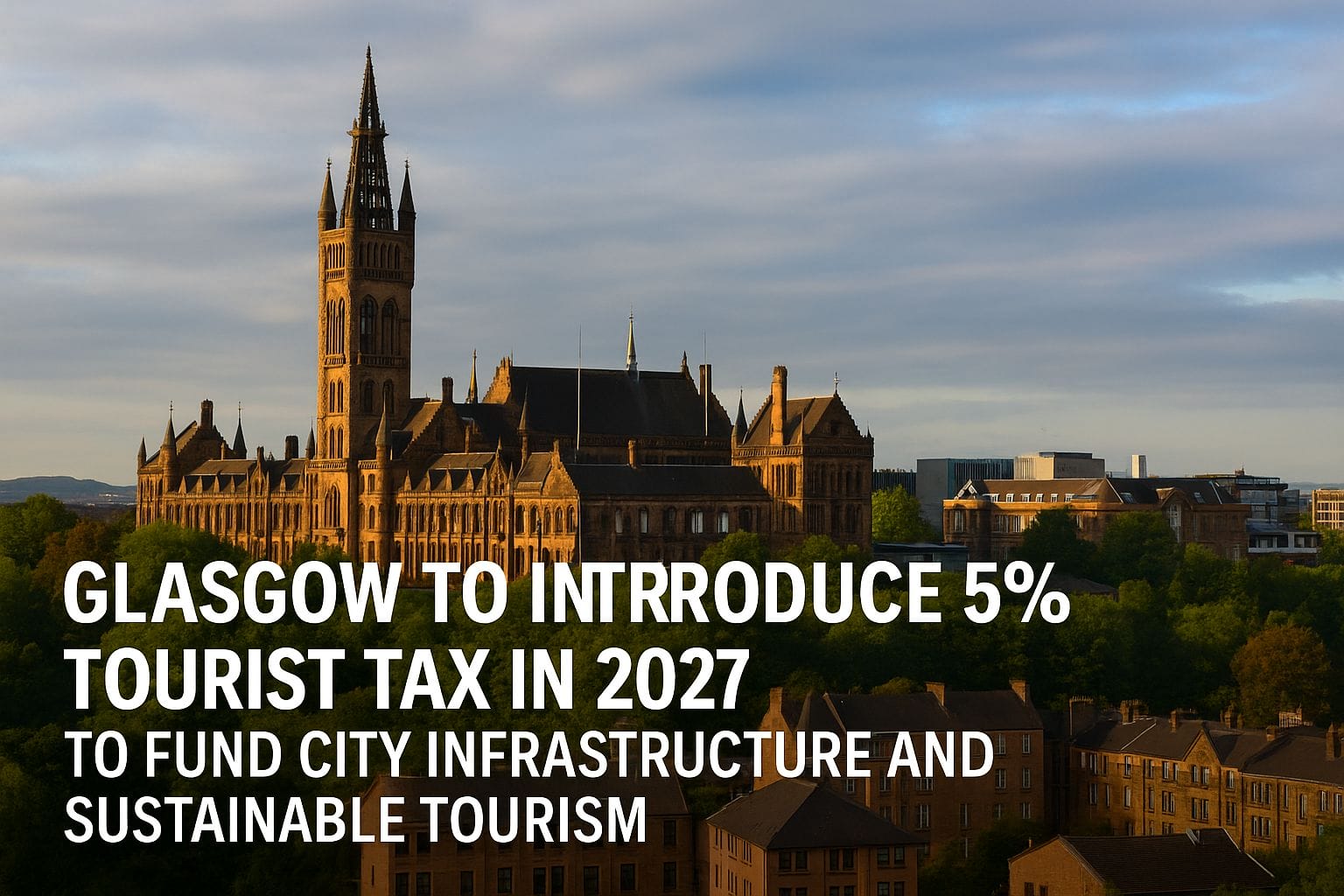Glasgow’s New 2027 Tourist Tax: A Milestone for Sustainable Tourism and Infrastructure Development
In a bold move towards sustainability and better urban planning, Glasgow, Scotland’s cultural powerhouse and second-largest city, has officially announced plans to introduce a 5% tourist tax starting in 2027. This strategic initiative aims to generate significant revenue for public services and infrastructure, directly enhancing the visitor experience and improving the quality of life for residents.
As the city welcomes nearly 2.9 million overnight visitors annually, the introduction of the tourist tax marks a transformative step in balancing the benefits of tourism with the growing pressures on city resources.
What the Tourist Tax Means for Visitors
The new tax will apply to overnight stays in hotels, B&Bs, hostels, guesthouses, and short-term lets, including platforms like Airbnb. The 5% charge will be added to the guest’s accommodation bill, translating to an average of £4.83 per night.
Accommodation providers will retain 1.5% of the levy to cover administrative costs, while the remaining funds will be allocated toward city-wide infrastructure projects, cleanliness efforts, and tourism development.
This tax model is not unique to Glasgow. In fact, it follows Edinburgh’s lead, which implemented a similar levy in early 2025. Across Europe, tourist taxes have become increasingly common, with cities like Paris, Rome, and Amsterdam using them to manage overtourism and reinvest in public services.
Why Glasgow is Implementing a Visitor Levy
Tourism plays a crucial role in Glasgow’s economy, contributing an estimated £250 million each year. However, this surge in visitor numbers puts a strain on local infrastructure, from public parks to sanitation services.
Glasgow City Council projects that the new tax could raise over £16 million annually, earmarked for:
- Street cleaning and waste management
- Maintenance of public parks and green spaces
- Preservation of historic landmarks
- Support for cultural and sporting events
These enhancements will not only improve the city’s aesthetics but also help Glasgow remain competitive in the global tourism market.
Positive Reception Across Political and Industry Lines
The introduction of the visitor levy has received strong backing from across Scotland’s political spectrum—including support from the Scottish National Party (SNP), Labour, Conservatives, and the Greens—as well as from local tourism boards and hospitality leaders.
Richard Bell, Deputy Council Leader, emphasized that the levy ensures fairness by asking those who enjoy Glasgow’s offerings but do not pay local taxes to contribute to city upkeep. He noted that the revenue will fund “projects that matter most to both locals and visitors.”
Hospitality operators who were part of a public consultation process earlier this year have expressed support, understanding that high-quality urban environments and cultural experiences directly benefit the tourism economy.
A Pathway Toward Sustainable Urban Tourism
For city leaders like Councillor Blair Anderson, this tax is more than just a funding mechanism—it’s a “game-changer” for Glasgow’s long-term tourism strategy.
By promoting sustainable tourism, Glasgow aims to avoid the pitfalls of overtourism seen in other global destinations. Instead, the city is investing in a model where visitors contribute to a cleaner, greener, and more inclusive environment.
Key priorities in the sustainable tourism agenda include:
- Eco-friendly public spaces
- Investment in community-led events
- Resilient infrastructure to manage seasonal visitor peaks
- Enhanced safety and accessibility features across public areas
Support for Culture, Festivals, and Events
Glasgow has a rich legacy of hosting world-renowned cultural events—from the Glasgow Film Festival to the Commonwealth Games. The new funds will help support existing festivals and launch new community-driven initiatives, positioning the city as a cultural beacon in the UK.
By ensuring the longevity of such programs, the city retains its status as a premier events destination, capable of drawing both domestic and international audiences.
Will the Tax Impact Tourism Numbers?
Experts believe the modest 5% charge will not deter tourists from visiting Glasgow. Instead, many believe that travelers will appreciate the transparency and the knowledge that their contribution will help improve the city for future visits.
Similar tax models in Amsterdam, Barcelona, and Berlin have shown minimal negative impact on visitor numbers, and instead, helped improve satisfaction rates and local support for tourism.
Implementation and Oversight
The levy’s rollout will be overseen by Glasgow City Council in collaboration with local hospitality operators. To ensure accountability, annual reports will detail how funds are allocated, showcasing tangible improvements made through the scheme.
This transparency is expected to strengthen public trust and increase collaboration between public bodies, local businesses, and the tourism sector.
Glasgow’s Vision for the Future
As Scotland prepares for a tourism resurgence in the post-pandemic era, Glasgow is setting a benchmark for responsible, inclusive, and future-proof tourism governance.
This tax represents a balanced approach—supporting tourism growth while safeguarding the city’s heritage, infrastructure, and local well-being.
With this initiative, Glasgow joins a growing list of progressive global cities taking ownership of their tourism economies and ensuring that visitors leave a positive footprint.
Conclusion
Starting in 2027, Glasgow’s new tourist tax will reshape how the city manages its booming tourism sector. With a modest 5% charge on overnight stays, the city will unlock an estimated £16 million annually to invest in cleaner streets, better public services, and vibrant cultural programming.
The initiative has been met with broad support and signals a major step forward in sustainable tourism for one of the UK’s most culturally dynamic cities.
As Glasgow continues to evolve, this measure ensures that every visitor plays a part in preserving and enhancing the city’s unique charm—making it a destination that benefits all who experience it.
For more travel news like this, keep reading Global Travel Wire
















